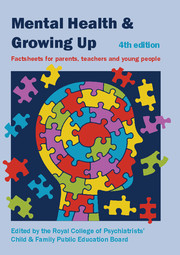Book contents
- Frontmatter
- Contents
- Contributors
- Factsheets for young people
- Factsheets for parents, carers and anyone who works with young people
- 1 Good parenting
- 2 The restless and excitable child
- 3 Dealing with tantrums
- 4 Children who soil or wet themselves
- 5 Sleep problems in childhood and adolescence
- 6 Behavioural problems and conduct disorder
- 7 Attention-deficit hyperactivity disorder (ADHD)
- 8 The child with general learning disability
- 9 Specific learning difficulties
- 10 Autism and Asperger syndrome
- 11 Depression in children
- 12 Worries and anxieties: helping children to cope
- 13 Divorce or separation of parents: the impact on children and adolescents
- 14 Death in the family: helping children to cope
- 15 The emotional cost of bullying
- 16 Traumatic stress in children
- 17 Domestic violence: its effects on children
- 18 Child abuse and neglect: the emotional effect
- 19 Drugs and alcohol: what parents need to know
- 20 Self-harm in young people
- 21 Psychosis
- 22 Schizophrenia
- 23 Bipolar disorder in children and adolescents
- 24 Obsessive–compulsive disorder in children and young people
- 25 Eating disorders in young people
- 26 Chronic physical illness: the effects on mental health
- 27 Medically unexplained physical symptoms
- 28 Chronic fatigue syndrome: helping your child get better
- 29 Parental mental illness: the problems for children
- 30 Who's who in CAMHS
16 - Traumatic stress in children
from Factsheets for parents, carers and anyone who works with young people
Published online by Cambridge University Press: 02 January 2018
- Frontmatter
- Contents
- Contributors
- Factsheets for young people
- Factsheets for parents, carers and anyone who works with young people
- 1 Good parenting
- 2 The restless and excitable child
- 3 Dealing with tantrums
- 4 Children who soil or wet themselves
- 5 Sleep problems in childhood and adolescence
- 6 Behavioural problems and conduct disorder
- 7 Attention-deficit hyperactivity disorder (ADHD)
- 8 The child with general learning disability
- 9 Specific learning difficulties
- 10 Autism and Asperger syndrome
- 11 Depression in children
- 12 Worries and anxieties: helping children to cope
- 13 Divorce or separation of parents: the impact on children and adolescents
- 14 Death in the family: helping children to cope
- 15 The emotional cost of bullying
- 16 Traumatic stress in children
- 17 Domestic violence: its effects on children
- 18 Child abuse and neglect: the emotional effect
- 19 Drugs and alcohol: what parents need to know
- 20 Self-harm in young people
- 21 Psychosis
- 22 Schizophrenia
- 23 Bipolar disorder in children and adolescents
- 24 Obsessive–compulsive disorder in children and young people
- 25 Eating disorders in young people
- 26 Chronic physical illness: the effects on mental health
- 27 Medically unexplained physical symptoms
- 28 Chronic fatigue syndrome: helping your child get better
- 29 Parental mental illness: the problems for children
- 30 Who's who in CAMHS
Summary
What are the signs of traumatic stress?
Individual children react in different ways to traumatic events. How they react may also depend on their age.
Immediately after the traumatic event, children may find it hard to sleep and have bad dreams and nightmares. Sometimes, the effects may not appear for days or weeks. Children may, however:
• become fearful, clingy and anxious about being separated from their parents
• start bed-wetting and thumb-sucking again
• become preoccupied with thoughts and memories of the event
• be unable to concentrate
• be irritable and disobedient
• complain of physical symptoms such as headaches and stomach aches.
All these are normal reactions to an extremely frightening event. With help and support from the people close to them, children begin to get over the shock in a few days, and usually recover after a few weeks.
What are the long-term effects of traumatic stress?
Sometimes a child has feelings of depression and anxiety that go on for several weeks and may get worse. If they continue for a long period of time, it is likely that the child may need some help to feel better.
If the traumatic experience was so bad that the child was in danger of being killed or seriously injured, they may have felt terrified, horrified and helpless. Post-traumatic stress disorder (PTSD) might follow a dreadful experience of this sort. It is difficult, however, to make a diagnosis in a child under the age of 7 years.
Some of the typical signs of PTSD
• ‘Flashbacks’ of the event. For a few moments, it seems as though you are reliving the experience in your mind, like watching an action-replay. This can be distressing and frightening, particularly for children.
• Deliberately avoiding thoughts or feelings about the traumatic experience. If the child has been in a car crash, they may avoid roads or even TV programmes about cars because it reminds them of the accident.
• Sleeping badly.
• Being easily startled and appearing frightened at the slightest noise.
These reactions can go on for months and can interfere considerably with a child's daily living. They may be unable to enjoy playing or find it difficult to concentrate on their schoolwork. Occasionally, these problems can continue as the child grows into adulthood.
- Type
- Chapter
- Information
- Mental Health and Growing UpFactsheets for Parents, Teachers and Young People, pp. 93 - 95Publisher: Royal College of PsychiatristsPrint publication year: 2013



